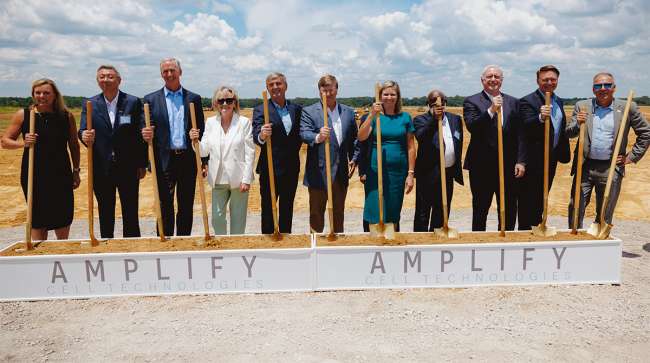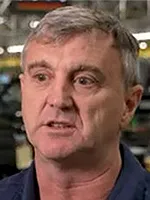Staff Reporter
Construction Begins on Truck Battery Cell Manufacturing Plant

[Stay on top of transportation news: Get TTNews in your inbox.]
Construction of Amplify Cell Technologies’ battery cell manufacturing plant in Marshall County, Miss., began in the last week of June, the joint venture among Accelera, Daimler Trucks & Buses U.S. Holding and Paccar said July 1.
The partners expect plant construction to be completed in 2027, with production of battery cells specifically for commercial vehicles scheduled to begin later in 2027, a spokesman for Daimler Truck North America said July 9.
DTNA is the parent company of Freightliner and Western Star as well as Thomas Built Buses, a major U.S. school bus market supplier. Paccar is the owner of U.S.-based truck makers Kenworth and Peterbilt. DTNA and Paccar brands accounted for 69% of all U.S. Class 8 retail sales in 2023.
The 500-acre site will house a 2 million-square-foot facility with annual manufacturing capacity of 21-gigawatt hours for lithium-iron phosphate battery cell production.
Amplify Cell Technologies, a joint venture between Accelera by Cummins, Daimler Truck AG Truck and PACCAR, begins construction of Mississippi battery cell factory. 🔋🔋🔋
Learn more: https://t.co/T0cNdastTT#DaimlerTruck #LeadingSustainableTransportation pic.twitter.com/7xPPK41Nac — Daimler Truck (@DaimlerTruck) July 5, 2024
Amplify expects the plant to cost $2 billion to $3 billion to build. Some 2,000 to 3,000 construction jobs will be created when construction is fully underway, a spokeswoman for Mississippi Gov. Tate Reeves said in a July 8 email.
The project is the largest payroll commitment in state history and the third largest overall investment in state history following a $10 billion investment by Amazon Web Services and $2.5 billion investment by Steel Dynamics.
Amplify’s plant at Chickasaw Trail Industrial Park is expected to create 2,000 manufacturing jobs with an average salary around $66,000, almost $20,000 more than the current average annual salary in the state, the governor’s office said in January when the location of the site was announced.
The site in Byhalia beat out 116 site submissions across 24 states, according to the state, with six states making Amplify’s backers’ long list and three states making the shortlist.
Project Poppy, the name of the bid to win the manufacturing plant, offered a total of $186.7 million in grants to Amplify, the documents show. That total included $120 million in “inside the fence” reimbursements, $40.7 million for land stabilization or pad construction and $24 million for training.
Also, Mississippi made a commitment to spend $123.4 million on local public infrastructure plus $127.4 million on further road infrastructure if traffic counts justify the expenditure.
Among other state commitments were a 10-year, 100% corporate income tax exemption plus sales and use tax incentives for construction and for any capital expenditure made in the 12 months after construction finishes.
In January, before the site location was revealed, Carl Hergart, Paccar senior director of global powertrain planning and agency, told Transport Topics many factors were being considered in the selection process, including tax incentives and supply chain logistics.

Kearns
The executive in charge of those logistics as well as the rest of the plant is ex-Ford Motor Co. executive Kel Kearns, the Amplify partners said June 4. A nearly 30-year veteran of Ford, Kearns’ most recent position was plant manager of the automaker’s Tennessee Electric Vehicle Center.
A significant part of Ford’s BlueOval City manufacturing complex in Stanton, Tenn., TEVC includes a 5 million-square-foot vehicle assembly plant for the automaker’s next generation of battery-electric vehicles. BlueOval City also includes a 4.2 million-square-foot battery cell manufacturing facility.
Amplify’s backers expect much greater demand for battery-electric trucks by the time the plant comes online after slower-than-expected adoption rates over the past couple of years.
“We thought if we built it, they would come, and we were wrong,” DTNA CEO John O’Leary told Advanced Clean Transportation Expo 2024 attendees in May.
Charging infrastructure buildout is lagging, which is constraining adoption rates, he told Transport Topics on the sidelines of the conference.
“I think what’s lacking is an end-to-end plan” to meet the power and charging demands of battery-electric truck fleets, O’Leary said, adding that charging had not changed much in the past 12 months.
“Things are not as robust as I would have hoped 12 months ago,” he said. “For sure, there’s a little more charging capability out there, a little more infrastructure, but the fact that industry sales have leveled off would indicate that we haven’t made progress — or very little progress.”
https://www.ttnews.com/articles/trucking-zev-infrastructurehttps://www.ttnews.com/articles/trucking-zev-infrastructure, as is Accelera parent Cummins. DTNA also plans to build its own truck charging network through the Greenlane venture.
Want more news? Listen to today's daily briefing below or go here for more info:




